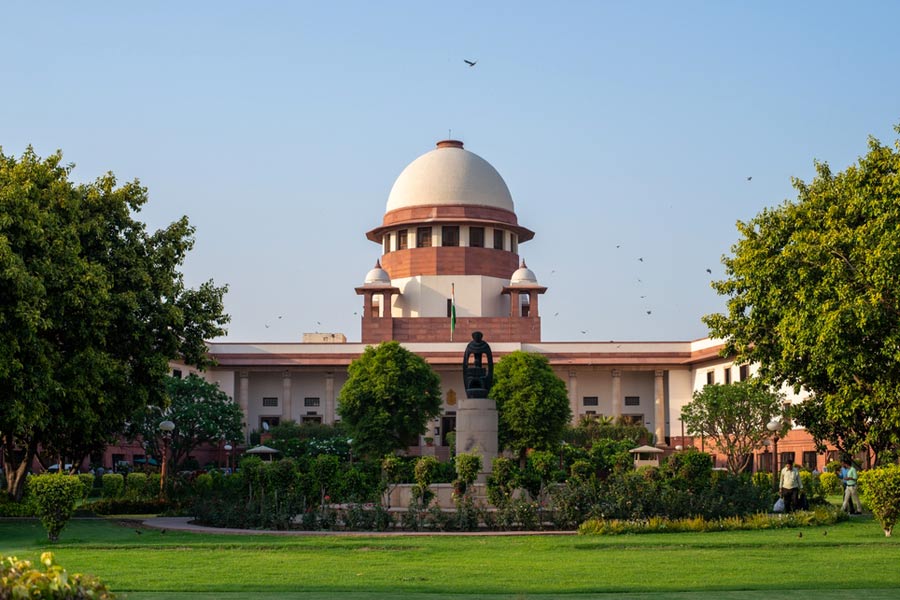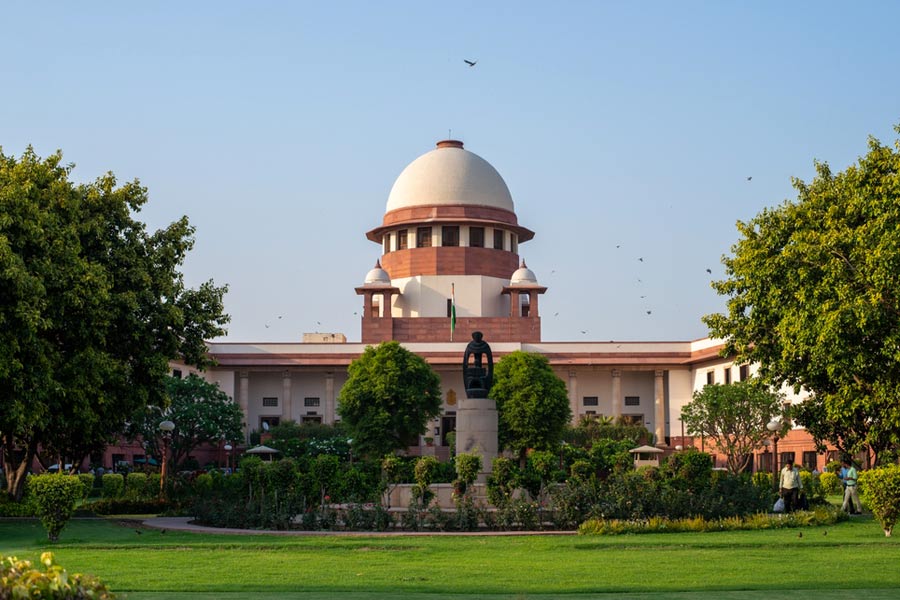The Supreme Court has ruled that the Enforcement Directorate cannot act out of vindictiveness and make arbitrary arrests under the Prevention of Money Laundering Act (PMLA), laying down that the central agency would have to furnish written grounds of arrest to the accused.
The court said such safeguards were both a fundamental and a statutory right of the accused. It slammed the central agency for its “clandestine conduct” over the arrest of a father and son from Haryana in a money-laundering case.
The Narendra Modi government has often been accused of using the ED and other central investigative agencies to settle scores with Opposition leaders and critics.
A bench of Justices A.S. Bopanna and Sanjay Kumar on Tuesday also held that trial courts cannot routinely remand people booked under the PMLA to custody without properly applying their mind and by relying solely on the ECIR (equivalent to FIR) and other materials placed before them by the ED.
Written grounds
The apex court referred to Rule 6 of the Prevention of Money Laundering Rules, 2005, that deals with Forms of Records. The rule provides that the arresting officer, while exercising powers under Section 19(1) of the Act, shall sign the arrest order.
“On the above analysis, to give true meaning and purpose to the constitutional and the statutory mandate of Section 19(1) of the Act of 2002 (PMLA) of informing the arrested person of the grounds of arrest, we hold that it would be necessary, henceforth, that a copy of such written grounds of arrest is furnished to the arrested person as a matter of course and without exception,” the Supreme Court said.
The court noted that the chronology of events in the case of Pankaj Bansal and his father Basant Bansal, both realtors, “speaks volumes and reflects rather poorly, if not negatively, on the ED’s style of functioning”.
“Being a premier investigating agency, charged with the onerous responsibility of curbing the debilitating economic offence of money-laundering in our country, every action of the ED in the course of such exercise is expected to be transparent, above board and conforming to pristine standards of fair play in action.
“The ED, mantled with far-reaching powers under the stringent Act of 2002, is not expected to be vindictive in its conduct and must be seen to be acting with utmost probity and with the highest degree of dispassion and fairness. In the case on hand, the facts demonstrate that the ED failed to discharge its functions and exercise its powers as per these parameters,” the court said.
‘Evasive’, but how?
The court noted that the failure of the appellants to respond to the questions put to them by the ED was “not sufficient in itself for the investigating officer to opine that they were liable to be arrested under Section 19, as that provision specifically requires him to find reason to believe that they were guilty of an offence” under the PMLA.
“Mere non-cooperation of a witness in response to the summons issued under Section 50 of the Act of 2002 would not be enough to render him/ her liable to be arrested under Section 19,” Justice Kumar, who authored the judgment, observed.
The bench set aside the arrest and detention of the Bansals, who had challenged the ED action as their names were not included in the first FIR.
The trial court and Punjab and Haryana High Court had both affirmed their arrests and remand based on three orders passed by a Panchkula court.
The Supreme Court pointed out that the ED had claimed Pankaj Bansal had been “evasive” in providing relevant information, but did not specify how. “In any event, it is not open to the ED to expect an admission of guilt from the person summoned for interrogation and assert that anything short of such admission would be an ‘evasive reply’,” the court said.
Reason for arrest
The apex court noted that Article 22(1) of the Constitution provides that no person who is arrested shall be detained in custody without being informed as soon as possible about the grounds of arrest.
“This being the fundamental right guaranteed to the arrested person, the mode of conveying information of the grounds of arrest must necessarily be meaningful so as to serve the intended purpose,” Justice Kumar said.
The bench noted that Section 45 of the PMLA lays down two bail conditions — first, the court must be satisfied, after giving an opportunity to the public prosecutor to oppose the application for release, that there are reasonable grounds to believe that the arrested person is not guilty of the offence; and second, that he is not likely to commit any offence while on bail.
“To meet this requirement, it would be essential for the arrested person to be aware of the grounds on which the authorised officer arrested him/ her under Section 19 and the basis for the officer’s ‘reason to believe’ that he/ she is guilty of an offence punishable under the Act of 2002.
“It is only if the arrested person has knowledge of these facts that he/ she would be in a position to plead and prove before the special court that there are grounds to believe that he/ she is not guilty of such offence, so as to avail the relief of bail...,” the top court said.
It added: “We may also note that the language of Section 19 of the Act of 2002 puts it beyond doubt that the authorised officer has to record in writing the reasons for forming the belief that the person proposed to be arrested is guilty of an offence punishable under the Act of 2002. Section 19(2) requires the authorised officer to forward a copy of the arrest order along with the material in his possession, referred to in Section 19(1), to the adjudicating authority in a sealed envelope.”
The court frowned on the “clandestine conduct of the ED”. It mentioned that the agency proceeded against the appellants by recording the second ECIR immediately after the father-son had secured interim protection in relation to the first ECIR. The court said this “reeks of arbitrary exercise of power”.












